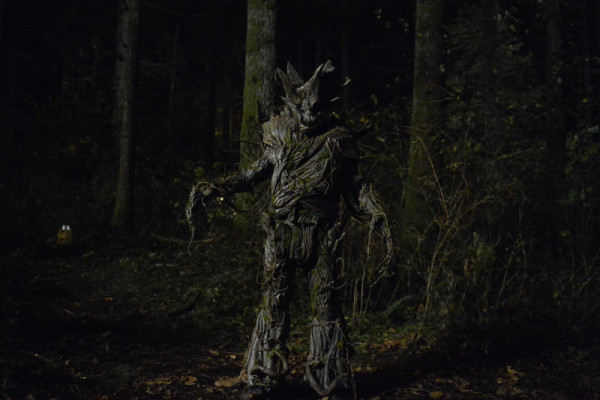Each week Joe and Terry discuss the most recent episode of HBO’s Lovecraft Country, alternating between our respective sites.
Spoilers follow for episode 4 “A History of Violence”…..
Episode 1.04 “A History of Violence”: After Christina (Abbey Lee) mysteriously shows up at her doorstep, Leti (Jurnee Smolett) confronts Atticus (Jonathan Majors) about his plan to surreptitiously return to Florida.
Later, in search of missing pages to a crucial text, Leti, Tic, and Montrose (Michael Kenneth Williams) head to Boston, with Hippolyta (Aunjanue Ellis) and Diana (Jada Harris) along for the ride.
Back in Chicago, a handsome stranger (Jordan Patrick Smith) nurses Ruby (Wunmi Mosaku)’s disappointment over a squandered job opportunity.
JOE
Well Terry, if you were looking for answers – and even more questions – “A History of Violence” is the episode for you! Last week you speculated that Montrose was gay and this week Tree (Deron J. Powell) seemingly confirms that Tic’s old man has indeed been getting chummy with Sammy (Jon Hudson Odom), the queer man involved in the alley BJ back in episode 1 “Sundown”. (Whether we should believe anything Tree says, considering he’s also the man who lied about “wrestling” with Leti back in HS, is up for debate).
More significantly, this episode elaborates on the conversation between Christina and Tic about Horatio Winthrop’s missing papers, which is what the majority of “A History of Violence” is dedicated to. As indicated in the plot summary above, a full car journeys off to Boston so that half of the group can partake in a full-blown Indiana Jones-style adventure involving statues, flooded passages, a literal sinking ship and a two-spirited trans character who is resuscitated from skeletal remains and then summarily dispatched in the episode’s coda by Montrose.
It’s A LOT, Terry!
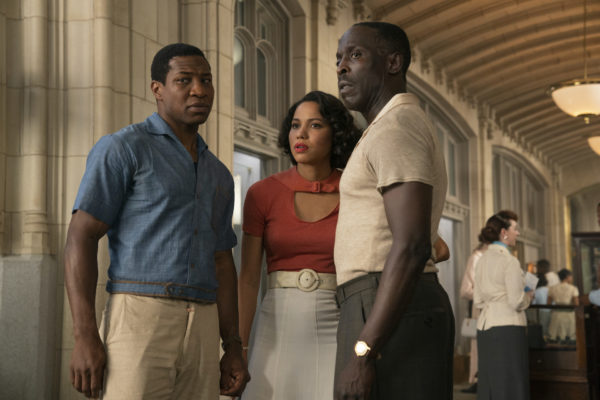
I’ll confess that I’m still grappling with my book to TV series dissonance this week. While I’ll easily concede that episode four features the best pacing of the series thus far, it’s difficult for me to reconcile some of the new developments Misha Green and her team have introduced.
While the general principles of the heist are the same – break into the museum after hours, find Winthrop’s vault and recover the missing pages – in Matt Ruff’s novel, they’re doing so under duress. The Christina proxy character has threatened the family, so George, Montrose and a few of the old guys decide to pull the heist in advance. Their plan is to swap out Winthrop’s edition of the Book of Adam and give Christina a false copy.
Tic and Leti don’t appear in this story (which never leaves Chicago) and Hippolyta and Diana also don’t tag along. I can definitely see the TV series setting up Hippolyta for her own adventure down the road (additional groundwork appears in the form of the stolen solar system model she took from Leti’s house last episode).
It’s the final moments and the introduction of a Two-Spirited trans Indigenous character named Yahima Maraokoti (Monique Candelaria) that’s throwing me for a loop. This sequence gave me some pretty heavy Pirates of the Carribean vibes, what with the reanimating skeleton, the ship and the booby traps – and it’s a nifty action sequence in an episode that features a lot of great action.
Then we come to that final sequence, where this character cursed with the inability to speak is executed via throat slit.
Now presumably Montrose’s motivation for this despicable act will be revealed later (I imagine it’s tied to something he read in the Order of the Ancient Dawn bylaws that George gave him before he burned them in the opening scene). And clearly Montrose is a damaged man: distraught over George’s death, likely living a closeted life and angry at Tic and Leti’s youthful inclination to rush into danger. But introducing an explicitly queer character and then having the other potential queer character murder them rubs me the wrong way.
Particularly in a year where we’ve seen rights for the trans community rolled back, and seen a number of trans WOC murdered, this storyline feels cheap, exploitative and traumatizing. I can only imagine what (queer) Indigenous viewers must feel when they seen themselves represented on this big budget HBO show, only for the character be murdered off unceremoniously. Again, I hope that the fall-out will be handled with care and given an appropriate response, but I don’t have high expectations.
Terry, what are your thoughts/speculations about that final scene? Did you like the old school action vibes? Any fresh insights on the music choices? (Rihanna’s “Bitch Better Have My Money” felt appropriately inspired AND simultaneously on the nose) And gosh, I haven’t even touched on Ruby’s sexy tryst with William!
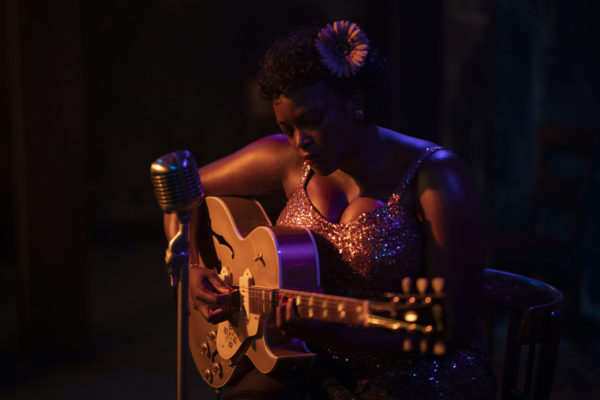
TERRY
Joe, I will never understand why people would actively choose to start their hanky-panky on a set of stairs. It just looks uncomfortable, particularly for the person on the bottom. I get that it probably looks fun on TV, but there has to be a bed just a few feet away. That said, I was all about Ruby getting that alabaster D from William…even though I know this is going to backfire.
Speaking of that scene and your question about music, someone on Lovecraft Country’s staff loves them some Marilyn Manson because his version of “I Put a Spell On You” is the second Manson jam this season (I’ve taken notes!) I’ve always found that song to be a sexy little number and it also fits, however unsubtly, with what’s playing out on screen.
This sequence was probably one of my favorites because I do love me a good seduction. This platinum blond stud just oozed sexuality at the bar and the chemistry between the two was incredibly hot, even if their choice of where to get their spell on was not. I know William is only seducing her to get access to the house because Christina’s ploy with Leti didn’t go so well, but I’m here for the fireworks while it lasts. I’m also guessing this is going to lead into next week’s episode’s theme.
It’s a segue, both in the episode and here, that I find works really well in “A History of Violence.” This episode is the first time that the series really feels like it’s embracing both the anthology nature of the source material and the possibilities of episodic storytelling. It balances the need to tell a character and situation-specific story, while also setting up future stories and plot threads. The first three episodes have struggled to overcome the “short story” nature of the book to the point that the pacing has been all over the place. “A History of Violence” manages to tell a compelling riff on Indiana Jones and, surprisingly, The Goonies, while also setting up little plot threads that will presumably feed into future episodes.
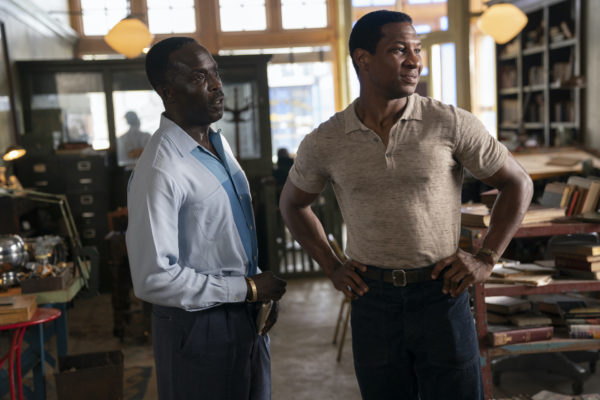
To step back a bit, I absolutely loved the way “A History of Violence” played with Indiana Jones and the Last Crusade. Montrose completely took on the curmudgeonly Henry Jones (Sean Connery) role to play off Tic’s young archaeologist. Even the traps felt pulled from The Last Crusade: in particular, the wooden beam across a bottomless pit and the swinging blades they have to pass through. It harkens back to what I said in our “Sundown” recap: “Misha Green is embracing the pulpy nature of the writing of that time to give Tic and his crew an actual adventure.” Adventure serials reached a frenzy in the 1930s and 1940s and I love that the Lovecraft Country team has created a serialized, archaeologist pulp adventure for Tic and his friends and family.
You mentioned the ship and the undead feeling straight out of Pirates of the Carribean, but I’ll be honest: when the trio climbed that rope ladder up into the bowels of the ship, I was immediately transported back to watching The Goonies as a kid. And as they explored the ship filled with desiccated corpses, I fully expected one of them to be One-Eyed Willy. Of course, Misha Green and her crew have a more searing focus than dead pirates; the corpses are all members of the Arawak tribe that our Two-Spirited Yahima also belongs to.
I have to agree, Joe, that this part really set me on edge…particularly as it leads to the throat-slashing you mentioned above. I find it troubling and problematic that the narrative introduces a queer, Indigenous Two-Spirited character that’s presented and utilized for shock value. From the unsubtle way their body is presented, to the way they’re used as an information dump, to the way they’re unceremoniously killed by, as you mentioned, another queer character. Every episode has ended with a cliffhanger or shocking death and by continuing that trend with a trans character who was introduced only to be similarly and shockingly murdered just feels so wrong.
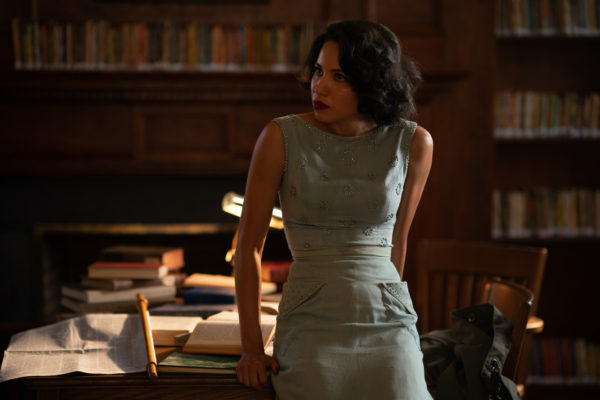
I would hazard a guess that this was Montrose trying, once again, to sideline Tic and Leti’s journey; something that he has constantly fought against and tried to roadblock. But I can’t imagine how he plans to talk his way out of this one. Dude just killed someone…it’s not as if he smothered Yahima and can play it off that they died in their sleep.
But you mentioned the book that Montrose had in his possession, gifted to him by the late George Freeman. I’m curious what you make of that little nugget of information, with its little redux of the creation of the world: “Adam Named / Eve Fucked / God Brought Forth Monsters / Monsters Devoured / God Smites Eve.” What did you think of the Ruby/William pairing? And continuing with that William line of thinking…what did you make of the 34 (or more) Lodges and the spat between Christina and Capt. Lancaster (Mac Brandt)? With Hippolyta deciding to make a U-ie to head back to Ardham…do you think we’ll see George again? And speaking of that U-Turn…did they just leave Tree in Boston?
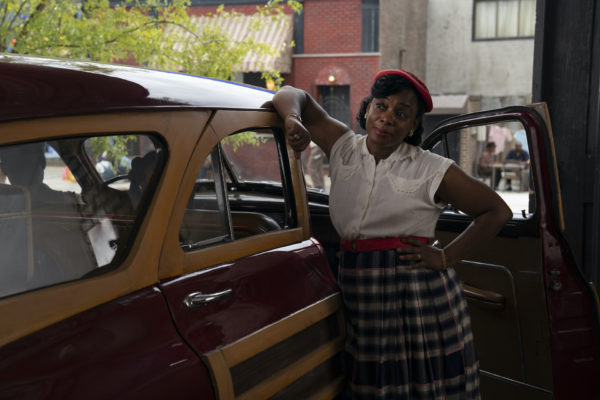
JOE
I also thought that the stair sex looked painful, so I was right there with you. Perhaps this speaks more about our penchant for vanilla than we care to admit?
Let’s move on. Lol.
I’ll confess that while I found the pacing to be much better in this episode, the logistics of how everyone (did or did not) get home to Chicago made no sense to me. I know we should just roll with these little inaccuracies, but considering that a significant deal is made at the beginning of the episode of them all cramming into that car, I couldn’t help but feel annoyed when we see Hippolyta and Diana by themselves at episode’s end. It’s a lazy loose end (and so obvious to any viewer!) that it took me right out of Hippolyta’s big moment.
So that’s annoying (though I reserve the right to change my tune if this means that we get to see Courtney B. Vance again).
I did like the brief scenes with Christina dealing with her own issues. The battle for Chicago between her and Capt. Lancaster is an integral component of the book, though we’re rarely privy to anyone’s perspective other than Tic and his family’s so this is another new element for the show. Again, this gentle opening up of Ruff’s world works, particularly in light of some of the other changes that are being made in the adaptation.
As for the revisionist Bible text? Umm…as an agnostic, I’m not exactly sure what to do with it. I think the deliberate inclusion of monsters in the text is fascinating, particularly if you look at the Sons of Adam as a weird religious sect (a bit of commentary on how bizarre and perverse religion can be that I’m sure has no real life parallels). Ultimately I’m not 100% sure it makes a ton of difference to the overall plot: all we truly need to know is that there are sacred texts that everyone wants to get their hands on in order to seize more power.
It’s a wee bit of a MacGuffin, but that’s ok. Some of my favourite stories come from that trope!
Back to you, Terry: do you think the book Montrose burned is truly gone? Did you like Tic and Leti going for the big “we survived” make-out? Do you truly believe that Christina has never played tag before? And what do you think happens next?

TERRY
It’s funny, Joe, I took a note about how sweet it was to see Christina play tag because, yes, I actually do believe she’s never played tag before. She comes from such a rich uppercrust family that I can imagine they’d look down on such frivolous things. I’m really curious to see what they do with her character–and William, for that matter–because moments like this really humanize her. Which is an odd feeling, given her family’s role in the persecution of…well, everyone who’s not white.
While I was here for Ruby getting herself a helping of William, I really find Tic and Leti’s relationship bland. That might be on me because I’m usually the one rolling his eyes whenever the protagonist of a show gets with their love interest. It made sense, I suppose, going from Montrose’s relationship advice about “always have a love song for your woman” to the kiss…but it feels like a sitcom relationship. They ended the last episode canoodling. Leti spends most of this episode being mad at him and even gets to shout my favorite line of the show so far, “Can you stop acting like this is only happening to you? You’re not the center of the fucking universe.” But by the end of “A History of Violence,” they’re back to the status quo. Not my favorite type of storytelling
…and in front of the just reanimated Yahima, to boot!
For next episode? Well, it’s called “Strange Case” which is a very obvious hint we’ll be in Jekyll and Hyde territory. If I had to hazard a guess, I’d say that Ruby is going to have “all her dreams come true,” as promised by William. But, of course, that won’t be what it’s cracked up to be.
As for the book? I can’t imagine they’d introduce it and then destroy it, so I anticipate it will make some kind of return. Maybe we’ll find out next week as we return to Gayly Dreadful for Episode 5, “Strange Case.”
